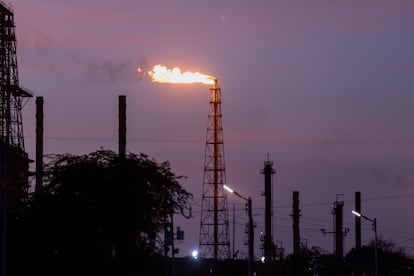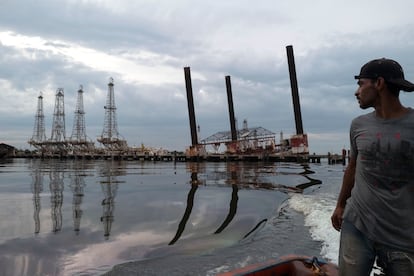With fewer sanctions, Venezuela sets foot on Wall Street
An increase in Venezuelan oil production may open the door to a debt restructuring, according to the financial sector

Alejandro Arreaza has been sleeping very little for more than a week. The economist at Barclays investment bank is responsible for analysis of Venezuela, his native country, and ever since the United States eased some financial sanctions against the Latin American country, his phone has not stopped ringing. “I think I’ve slept three hours a night,” he says on a video call from his office in New York. “No one expected such a broad easing of sanctions.”
On October 18, the U.S. Treasury Department announced that it will allow operations linked to the oil and gas sector in the South American country for the next six months, thus lifting a restriction in place since 2019. Venezuela has the largest oil reserves in the world, but the government of Nicolás Maduro has been forced to sell it on the black market and at a discount due to U.S. prohibitions, so the lifting of this ban has important implications. On the other hand, U.S. funds and banks still cannot buy Venezuelan debt bonds, but they can go to the secondary market to buy old bonds on which Venezuela defaulted. This move has injected life into the stock, which rose in price after the announcement.
There are a mix of reasons that led to this decision by Washington. Since Russia began its military offensive in Ukraine, Western countries have sought alternative sources of oil to avoid financing Putin’s regime. Venezuelan oil, therefore, is now more attractive and it is even expected that new production could alleviate fuel prices on an international scale. A second factor is local politics in Venezuela, since the government has committed to holding elections next year.
Other factors are also added to the energy market. “I think that today the immigration issue weighs more than the oil issue and local politics,” says Arreaza. The same day that the easing of sanctions was announced, the Biden Administration sent the first flight of deported undocumented immigrants back to Venezuela. The numbers of Venezuelans arriving at the border with Mexico and requesting the right to live in the United States has increased; the government of New York State warned on October 5 that the state’s finances can no longer sustain the flow of immigrants. “That also played a role in putting pressure on some kind of change,” Arreaza continues, which explains why the sanctions went far beyond what Wall Street expected.

This week, a committee representing bondholders holding more than $11 billion of Venezuela’s debt (out of a total of $60 billion circulating in the market today), on which Venezuela defaulted in 2016, issued an optimistic statement. The Venezuela Creditors Committee said it was “confident the actions by the U.S. government and the commitments of the Maduro administration and Venezuelan opposition will ultimately lead to the orderly restructuring that Venezuela so desperately needs.” The Committee said it is willing to engage constructively with all interested parties to move forward.
A report published by the analysis firm Latinometrics on Wednesday indicates that Venezuela owns 18% of all the oil in the world. At its peak, the country produced more than three million barrels per day, while today it produces quantities similar to those of Ecuador, a much smaller country, with reserves equivalent to only 3% of Venezuela’s. Wall Street is betting that oil production will lift the economy of the country, where there is a humanitarian crisis and a large part of the population suffers from hunger.
“There’s an expectation that without that much investment, you could get at least some more oil flowing out of the country, maybe get to 500,000 to 700,000 barrels a day and that could get to a million very quickly,” says Steve Bodzin, a reporter for the firm Redd Intelligence, specialized in the fixed income market in the Andean region. The size of Venezuela’s economy is not known with certainty, since the government stopped publishing data and indicators years ago. But considering its dramatic contraction, a small injection of oil resources could have a significant impact. “The view is that this is a country and an economy like one of those giant inflatables that’s just laying on the ground and you just turn on a fan and it blows right back up.”

Such an increase in oil resources could be equivalent to 8% of Gross Domestic Product, says Arreaza, “but there has been a deterioration in the capacity of the state-owned company to extract and produce crude oil, so it is not in a position to be a true energy alternative for the West.” The American company Chevron received a license to operate in the Latin American country a year ago and it is expected that most of the increase in production will come from its fields.
“This is a partial return of Venezuela, but we still do not know to what extent,” says Arreaza. “From the market’s perspective, it is seeing this as an oil story, thinking that, regardless of what happens on the political level, the oil factor could open a door to restructuring the debt. I would be a little more careful. I believe that there is still a lot of fabric to be cut and Venezuela, at this moment, remains essentially a political bet. A lot will depend on what happens on the political level.”
Sign up for our weekly newsletter to get more English-language news coverage from EL PAÍS USA Edition
Tu suscripción se está usando en otro dispositivo
¿Quieres añadir otro usuario a tu suscripción?
Si continúas leyendo en este dispositivo, no se podrá leer en el otro.
FlechaTu suscripción se está usando en otro dispositivo y solo puedes acceder a EL PAÍS desde un dispositivo a la vez.
Si quieres compartir tu cuenta, cambia tu suscripción a la modalidad Premium, así podrás añadir otro usuario. Cada uno accederá con su propia cuenta de email, lo que os permitirá personalizar vuestra experiencia en EL PAÍS.
¿Tienes una suscripción de empresa? Accede aquí para contratar más cuentas.
En el caso de no saber quién está usando tu cuenta, te recomendamos cambiar tu contraseña aquí.
Si decides continuar compartiendo tu cuenta, este mensaje se mostrará en tu dispositivo y en el de la otra persona que está usando tu cuenta de forma indefinida, afectando a tu experiencia de lectura. Puedes consultar aquí los términos y condiciones de la suscripción digital.









































